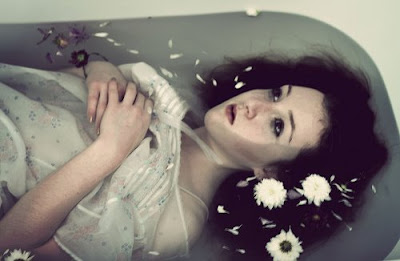







Polonius: Marry, I will teach you: think yourself a baby

Ophelia is conditioned to believe that what is of most value about her is her virginity. Laertes tells her in I.iii. "Then weigh what loss your honor may sustain If with too credent ear you list his songs, Or lose your heart, or your chaste treasure open To his unmast'red importunity." Polonius echoes these warnings shortly thereafter, emphasizing the amount of masculine pressure put on Ophelia. But Ophelia is also blossoming into womanhood, developing a natural curiosity about sex and inspiring desire in young Hamlet. How's a girl to manage being sent so many mixed messages? In order to be desirable she must embody feminine virtues (obedience, passivity, sweetness, chastity, etc.), and yet her obedience to her father is the very thing that takes her farther from the object of her desire. The skills that she has cultivated include a diverse repertoire of folk songs as well as an almost Victorian knowledge of herbs and flowers, both their meanings and arrangement. She is herself a flower, full of springtime and loveliness, but lacking any real world utility. This is all fine and well until Act Four, when Polonius is murdered by Hamlet, who is then sent to England. There is no big brother to turn to, as Laertes has returned to school. She is left alone to deal with a situation that she is completely incapable of handling. No one has taught her how to think for herself, and the lack of female companions in Castle Elsinore means that her idea of what it means to be a woman is what men think women should be. The closest thing she has to a mother figure is Queen Gertrude, who wears sensuality like a diamond tiara. Gertrude, who is really an Ophelia matured to perfection, has learned how to stay afloat in a man's world. She swims in the same waters Ophelia drowns in.

Of all the characters in Hamlet, my clearest mental image is of this watery, weedy damsel. Perhaps it is because she has been a favorite subject of artists and poets throughout history. She has the curves of womanhood, but her face is open and infantile: wide eyes, rosy cheeks, soft ringlets, and a generous cupid's bow pout. Like a baby, she is designed to look cute so that someone will want to take care of her. In her distress, she turns again to childhood songs and daisy chains. By the time Laertes returns to Denmark, overwhelming grief has already pushed her mind past the breaking point. In the mad scene, we hear for the first time her uninhibited voice, and with it she completely dominates the limelight. It really makes you wonder what sort of person she could have been if only she had had the social liberties and education of a modern woman. One lingering question I am left with is this: If Gertrude can describe with such detail the events leading to Ophelia's death, why did she do nothing to stop it? What was she doing out by the water in the first place?
*A clip from Slings and Arrows: Geoffrey explains Ophelia's madness.
